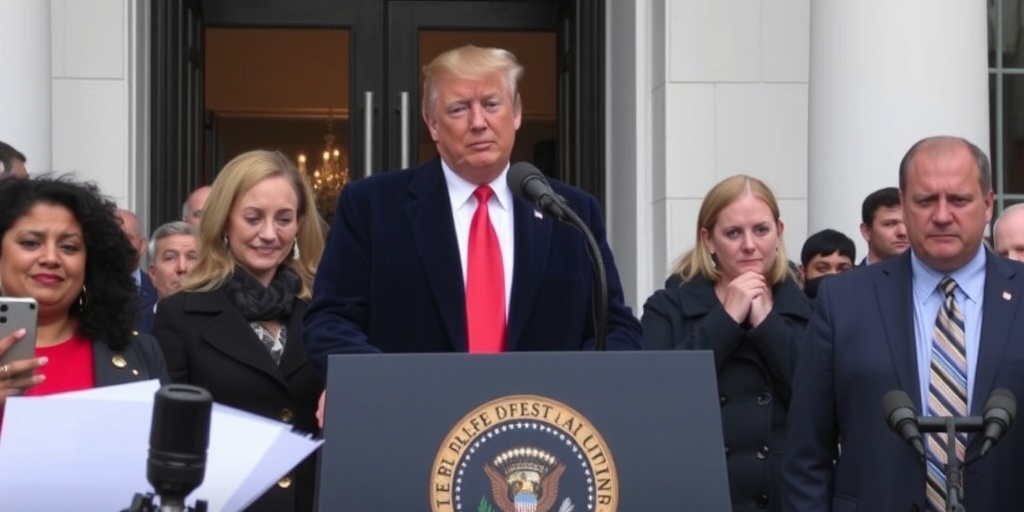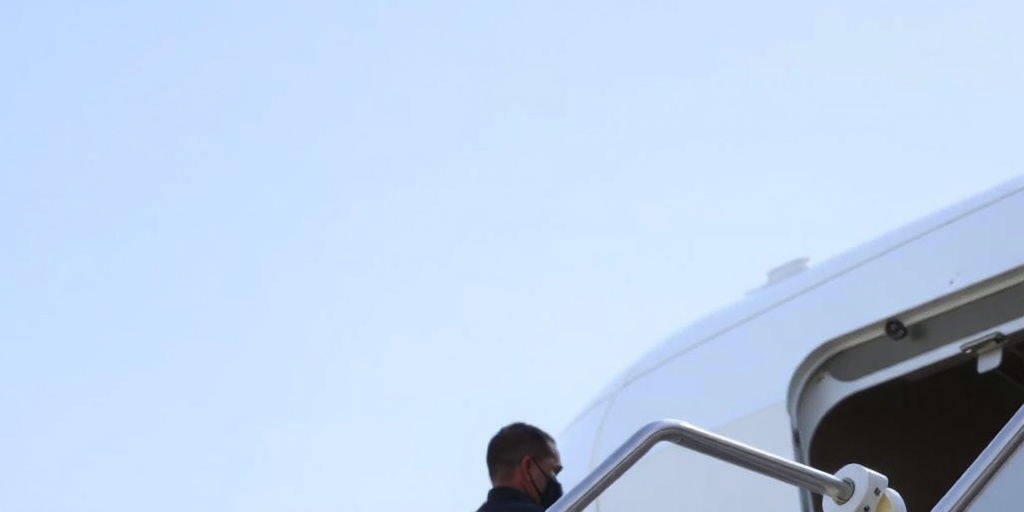Now Reading: Trump’s Refugee Admission Suspension Threatens Afghan Lives, Advocate Warns
-
01
Trump’s Refugee Admission Suspension Threatens Afghan Lives, Advocate Warns
Trump’s Refugee Admission Suspension Threatens Afghan Lives, Advocate Warns

Title: New Executive Order by President Trump Suspends Refugee Admissions, Affecting Afghan Allies
In a significant policy shift, President Trump signed an executive order on Monday that temporarily suspends the admissions of refugees to the United States. This decision raises serious concerns for many individuals, particularly those from Afghanistan who have assisted American forces during the two-decade-long conflict in the region. Shawn VanDiver, the president of AfghanEvac—a coalition of over 250 organizations dedicated to resettling Afghan allies—expressed alarm at the implications of this order, stating it threatens the safety of thousands of Afghan citizens who currently face persecution from the Taliban.
The executive order, titled “Realigning the United States Refugee Admissions Program,” will take effect next Monday and does not outline a timeline for when the suspension might be lifted. Instead, it indicates the ban will remain in place until the “entry of refugees aligns with the interests of the United States.” VanDiver criticized the order as another instance of the United States reneging on its commitments, emphasizing that it risks abandoning the Afghan allies who stood alongside U.S. service members.
This executive action does not merely endanger Afghans who are currently hiding from Taliban reprisals. The order further impacts the families of active-duty U.S. service members and veterans who worked closely with Afghan nationals during their military service. The situation has drawn attention, especially among veterans’ groups who are advocating for the protection of their allies.
Historically, the U.S. has taken pride in its refugee programs, framing itself as a leader in the realm of human rights. Typically, the president makes an annual decision regarding how many refugees will be accepted into the country for the upcoming fiscal year. After the tumultuous U.S. military withdrawal from Afghanistan and the subsequent takeover by the Taliban, the Biden administration initiated Operation Allies Welcome. This program successfully facilitated the entry of approximately 76,000 evacuated Afghans into the U.S. for humanitarian reasons, according to data from the Migration Policy Institute.
As of 2023, over 90,000 Afghans have integrated into American society, aided by advocacy and resettlement organizations. However, many refugee agencies have been preparing for a potential cutback in admissions, especially after Trump’s electoral victory in November 2020. During his previous term, Trump enacted an executive order that prohibited entry from six Muslim-majority countries and dramatically reduced the overall refugee cap to a record low of about 11,000 in 2020. This cap left many refugees stranded in camps across Kenya, Tanzania, and Jordan.
Following his inauguration in January 2021, President Biden reinstated refugee admissions to facilitate a more humanitarian approach to immigration. In the fiscal year ending September 30, 2024, about 100,000 refugees were welcomed into the United States, marking the highest figure in nearly three decades.
As Trump announces his candidacy for the 2024 election, the conservative policy framework known as Project 2025 has indicated that he may leverage the recent surge of migrant crossings at the southern border as a rationale for halting the refugee resettlement process. The recent executive orders focus extensively on cracking down on illegal immigration while formally ending programs that had previously allowed migrants from countries such as Cuba, Venezuela, Haiti, and Nicaragua to reside in the U.S. temporarily, provided they had a financial sponsor and passed the necessary security checks.
The new refugee order states, “Over the last four years, the United States has been inundated with record levels of migration, including through the U.S. Refugee Admissions Program (USRAP). Cities and small towns alike… have seen significant influxes of migrants.” However, dissenting voices, such as VanDiver’s, argue that there remains substantial public sentiment supporting the continued resettlement of Afghan allies. Surveys indicate that a large majority of Americans favor upholding commitments to those who aided U.S. forces in Afghanistan.
VanDiver pointed out that individuals entering under the U.S. Refugee Admissions Program have undergone thorough vetting processes that include extensive background checks, medical screenings, and verification of their service. As a result, he expressed grave concerns that Trump’s executive action will effectively throw many Afghan refugees into a state of uncertainty, freezing their cases and hindering their ability to travel to the U.S. Furthermore, additional executive orders focusing on national security could impose further restrictions on Afghan nationals seeking refuge.
In response to these alarming developments, VanDiver and his coalition have mobilized support from over 700 individuals, including veterans and civilians who worked in Afghanistan, advocating for the exemption of Afghan allies from the suspension. They emphasize that failing to protect these individuals sends a troubling message about U.S. commitments, suggesting they may be conditional and not to be trusted.
In light of these developments, it is crucial to assess the ramifications this order may have not only on Afghan allies but also on the credibility of the United States as a committed partner on the global stage in humanitarian efforts.
Stay Informed With the Latest & Most Important News
Previous Post
Next Post
-
 01New technology breakthrough has everyone talking right now
01New technology breakthrough has everyone talking right now -
 02Unbelievable life hack everyone needs to try today
02Unbelievable life hack everyone needs to try today -
 03Fascinating discovery found buried deep beneath the ocean
03Fascinating discovery found buried deep beneath the ocean -
 04Man invents genius device that solves everyday problems
04Man invents genius device that solves everyday problems -
 05Shocking discovery that changes what we know forever
05Shocking discovery that changes what we know forever -
 06Internet goes wild over celebrity’s unexpected fashion choice
06Internet goes wild over celebrity’s unexpected fashion choice -
 07Rare animal sighting stuns scientists and wildlife lovers
07Rare animal sighting stuns scientists and wildlife lovers





















